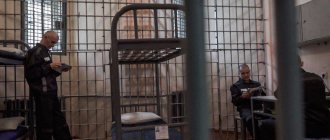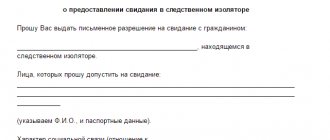Any prisoner dreams of seeing his relatives, because a long stay behind bars makes the longing for them simply unbearable. News from relatives, letters and packages, of course, bring a lot of joy, but seeing the face of someone dear to you is perhaps the greatest event you can imagine while in prison.
But for a person who comes on a date to a pre-trial detention center, just like to a prison, this is always a relatively stressful situation. However, there are special rules that must be followed in order to be able to see the convicted person.
Permission to visit in a pre-trial detention center
Article 395 of the Criminal Code of the Russian Federation states that people temporarily under investigation in a detention center can see their relatives twice a month. Such meetings are very short-lived. To do this, you need to take a sample application for a visit to a pre-trial detention center and fill it out in the proper way.
Permission to visit a pre-trial detention center may or may not be issued by the investigator. A judge can also sign such statements. The head of the pre-trial detention center can also allow visits with relatives. But he can do this only after a guilty verdict.
Regarding letters, it is worth saying that a person under investigation has every right to receive correspondence. Mail can be sent to the defendant every day without restrictions.
According to general standards, a visit to a pre-trial detention center can last up to 3 hours. Such a meeting is carried out with the permission of an official and takes place in a special room of the detention center. However, if we are talking about a meeting with a person who is in a temporary detention center, then you cannot count on a meeting at all. This is not provided here.
Kinds
The pre-trial detention center is characterized by 3 types of procedures:
In the period before the verdict is announced
The law does not establish restrictions on who has the right to receive a visit. Therefore, we can say with confidence that anyone can apply. But when submitting an application, you will need to document the extent and type of relationship with the prisoner; therefore, it will be difficult for everyone except relatives to prove the validity of their request. For this category of people who cohabit or are in a so-called civil marriage, it will be necessary to somehow prove the validity of cohabitation, for example, registration at the same address, the presence of joint bank accounts, etc.
From the date of proclamation to the date of entry into force
This type falls under the provisions of Article 395 of the Code of Criminal Procedure of the Russian Federation:
Before the sentence is executed, the presiding officer at the court hearing in a criminal case or the chairman of the court, at the request of close relatives of the convicted person in custody, provides the opportunity to visit him.
Meeting after the appeal.
According to Article 75 of the Criminal Executive Code of the Russian Federation:
Those sentenced to imprisonment are sent to serve their sentence no later than 10 days from the date the administration of the pre-trial detention center receives notification that the court verdict has entered into legal force. During this period, the convicted person has the right to short-term visits with relatives or other persons.
Who can get a visit to a pre-trial detention center?
The lawyer and close people of the prisoner have the right to meet with the defendant. At the same time, no more than two people can come to such a person. If a person who has not reached the age of majority wants to see a prisoner, this is quite possible, and no one has the right to prohibit such a meeting. If you receive a refusal, you must complain to the investigative authorities or directly to the prosecutor's office.
The following are not allowed to visit the pre-trial detention center:
- persons under the influence of alcohol;
- people whose names are not indicated on the relevant permit;
- citizens without documents proving their identity.
The meetings themselves with the person under investigation can be long or short-term. Persons in pre-trial detention centers are usually given the opportunity to visit for up to 3 hours. You can choose any day for the meeting, with the exception of sanitary days.
In practice, people are generally given permission to visit a pre-trial detention center for 2 hours. You can count on spending longer time with the prisoner after the verdict is passed, at a time when the pre-trial detention center will have the relevant documents from the court, because until that moment the person has the status of an accused, but not a convicted person. It is worth noting that during appeal proceedings, the defendant is also just an accused from a legal point of view. Based on this, meetings are only possible for a short time in special rooms with a bulletproof glass barrier.
Meetings with a notary
Meetings in a pre-trial detention center with a notary representative are carried out under the same conditions as with a lawyer: alone, without glass partitions or listening devices. The pre-trial detention center officer can see what is happening in the room, but not hear the conversation.
The number and duration of meetings between the defendant and the notary in order to certify the power of attorney for the right to represent interests in the field of entrepreneurial activity are not limited (clause 3.1, part 4, article 46 and clause 9.1, part 4, article 47 of the Code of Criminal Procedure of the Russian Federation).
A notary has the right to bring to meetings with a client in custody objects and documents that he needs to carry out his professional activities, incl. copying and duplicating equipment.
If a notary attempts to transfer prohibited items to a prisoner, the meeting will be immediately interrupted. The administration of the pre-trial detention center initiates an investigation upon the early termination of the visit. The territorial body of the Ministry of Justice of the Russian Federation will be promptly informed about the violation. The conclusion with copies of the inspection materials will be sent to the notary chamber of the subject of the Russian Federation, of which the notary is a member, to resolve the issue of his responsibility, with subsequent notification to the administration of the pre-trial detention center.
How to get a meeting with a convicted person in a pre-trial detention center?
To get a date in a pre-trial detention center, you must write an application to an official of this institution. Usually this person is the investigator, and if he refuses you, you must demand that he refuse in writing.
It is possible to refuse a visit only for essential reasons. And it definitely depends solely on the specifics of the case. If an official refuses for unexplained reasons, you should complain to management about him and, if possible, use the help of a lawyer. But when the reason for the refusal is explained by the “interests of the investigation,” then getting a date is unlikely to be possible.
How is a meeting in a pre-trial detention center going?
If a visit is allowed in a pre-trial detention center, you will be asked to go to a special room where you can see the accused. This is a room where there is usually a bulletproof glass partition, and you can communicate with the prisoner using a special intercom. It should be understood that all conversations can be monitored.
Before entering the meeting room, you may be searched, and your bag and all pockets will be turned inside out. You shouldn't object to this. This is the order in such establishments. If you want to make a transfer to a prisoner, all items will also be carefully checked. Please note that even regular cigarettes will be broken, which is done to ensure that prohibited items, substances or drugs do not get into the detention center.
When it comes to a meeting in a pre-trial detention center with a lawyer, such negotiations take place without partitions in the presence of only the lawyer and the prisoner. As for the application to the investigator for a visit to the pre-trial detention center, the sample can be taken from him, filled out and provided to him. This document can also be handed over to the judge, the appeal board or the head of the pre-trial detention center.
In the header of such an application you must indicate the name of the detention center and the name of the official from whom the permit is taken. The document contains a request for a meeting with the arrested person, with a date and signature at the bottom.
If the pre-trial detention center prevents you from meeting with the accused, you should contact a lawyer. Longer visits in a pre-trial detention center with a convicted person (more than three hours) are possible only after a verdict has been passed.
Lawyer's rights
A lawyer, unlike relatives and other persons, has more opportunities to visit the suspect or accused. He does not need the consent or permission of the investigator to visit, since suspects and accused are granted visits with a defense lawyer from the moment of actual arrest. In addition, visits are provided privately and confidentially, without restrictions on their number or duration. A meeting between a suspect or accused and his defense attorney, unlike relatives, can take place in conditions that allow the pre-trial detention center officer to see but not hear, and this is a huge advantage.
It is widely known that not every investigator or judge gives permission to relatives, much less close persons, to visit the arrested person. For a long time, relatives have no idea what is happening to the suspect or accused in the pre-trial detention center, how he feels, what his needs are.
It is not always possible for a suspect or accused to openly convey information about his needs to a pre-trial detention center through a letter, since all letters are censored, so it is worth understanding that a lawyer is the only legal channel for full communication with an arrested relative.
Meetings between the defendant and the lawyer
The number of meetings between a suspect or accused and a defense lawyer is not regulated. There can be as many meetings as you like, and they can last as long as the lawyer and the person under investigation need.
Meetings with the defense attorney take place one-on-one, without glass partitions or intercoms, in complete confidentiality. The pre-trial detention center employee only has the opportunity to see the participants in the conversation, but not hear its content.
If a lawyer makes an attempt to transfer prohibited items, substances, or food to the defendant, the meeting will be immediately terminated. The administration of the pre-trial detention center initiates an investigation upon the early termination of the visit. The territorial body of the Ministry of Justice of the Russian Federation will be promptly informed about the violation. The conclusion with copies of the inspection materials will be sent to the Council of the Bar Chamber of the constituent entity of the Russian Federation, of which the lawyer is a member, to resolve the issue of his responsibility, with subsequent notification to the administration of the pre-trial detention center.
Meeting in a pre-trial detention center. Recommendations for relatives
If you want to meet with the prisoner as quickly as possible and without unnecessary hassle, you should know that applications for a meeting are usually accepted in such institutions from 10.00 to 12.00 hours. It is also worth understanding that there are queues, so you should hurry. Usually people arrive from the very early morning in order to have time to simply submit an application.
When you go on a date, it's best to do several things at once. For example, in one visit you can not only make a transfer for an arrested person, but also send money to his personal account. Along with this, you can also send a letter, which the prisoner should receive on the same day. Food and other items can also be handed over through the prison (isolation) kiosk, for which a certain payment is taken.
You won't be able to give everything to a prisoner. Please note that tea, both black and green, may not be accepted. Therefore, buy inexpensive medium-leaf tea. As for cigarettes, they can be transferred in strictly limited quantities.
If there is a need to donate food, then it is most advisable to buy, for example, instant noodles, cereals, mashed potatoes, that is, something that can be cooked using a boiler. It is also allowed to transfer vegetable and butter oil, canned meat and fish, but no more than two cans.
You can transfer vegetables and fruits with the exception of citrus fruits. After all, such fruits are often used to transfer alcohol to the prisoner, which is pumped directly into them. Sugar can be transferred no more than 2 kilograms.








